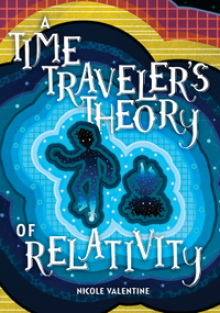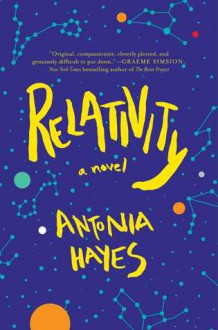
Finn Firth is on the verge of turning 13, and is convinced his father will forget his birthday. Which is troubling to him, but really, it's the least of his troubles. When they were three, his twin sister drowned (and he's always felt this absence, and is sure everyone around him does, too). He's not that close with his father, and his mother left home a few months ago, with no warning and no one has heard from her since. Also, his best (only?) friend, Gabi, has been spending less time with him and more time with new friends—the kind that would bully him. He's also a huge science nerd, the kind of twelve-year-old who reads (and re-reads) Richard Feynman and Carl Sagan for entertainment. The fact that he's an outsider, that he's not like the other kids at school is what drives him (like so many) to science, to something he can make sense of and put himself/his trouble in perspective.
So imagine his surprise when his grandmother informs him that she's a time traveler, actually, all the women in his family have been and are. It's not just his family, there are people throughout the world capable of this. Some in his family are more powerful than others, most can only travel to the past—one could only travel to the past but during her lifetime—his grandmother and mother are among the few that can travel forward in time. His mother, he's told, didn't leave his father and him. Finn's dad has been reassuring him that "she just needs some time," and well, that seems to be the case after all. She's stuck somewhere, unable to come back—but she's created a way for Finn to come and get her (despite being a boy).
Time travel is impossible, Finn knows—and even if it weren't, the kind of travel his grandmother describes sounds more magical than scientific. He tells his grandmother this, in fact. But—I won't get into how, it should be read in context—he's given some pretty convincing proof.
Now there are those who don't think Finn should be doing anything regarding time travel, and that no one should be tracking down his mother. And they're seemingly willing to take some extreme measures to stop him. He and Gabi set out on an adventure to evade these others and get to his mother's portal. Finn's ill-prepared for what lies ahead, but he doesn't care. Between brains and sheer determination (and largely it's the latter), he's going to find his mom.
What he never stops to ask is: what else will he find?
This is a fun little read—Finn and Gabi are well-developed characters, his various family members are interestingly and distinctively drawn, the writing is crisp and brisk—once things get going, they stay going, and it's easy to get swept up in it The best is the mix of science and . . . however you end up describing the time travel. For a book directed toward the 9-14 set, the science (time travel, chaos theory, multi-world theory, etc.) is presented plainly and without condescension. That last point, in particular, resonated with me.
The heart of this book is found in two concepts—the power of individual choice, and the importance of kindness in spite of everything. Lessons good to be absorbed by the target audience, as well as the rest of us.
I really enjoyed this book and heartily recommend it. One thing, though, kept running through my mind as I read it. As much as I enjoyed A Time Traveler's Theory of Relativity, when I was 8-13, I would've loved it (probably when I was 14 and 15, too—I just wouldn't admit to liking a book written for younger people at that time). It's the kind of book that I would've been checking out of the library every two or three months. Get this for yourself and enjoy it, get this for your kid for them to obsess over.
Disclaimer: I received this eARC from Carolrhoda Books via NetGalley in exchange for this post—thanks to both for this opportunity.


 Log in with Facebook
Log in with Facebook 









